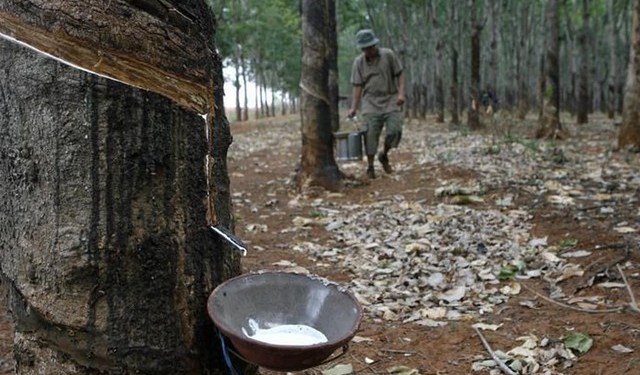Rubber planters have threatened roadblocks in four regions of the country on Sept 3 to protest against the government’s failure to stop prices from plunging.
The Yingluck Shinawatra government has shown no sincerity about solving their immediate problems, said Terdsak Sermsri, chairman of the Rubber Planters Network of Thailand.
Rubber planters were being left behind while the government devoted all its attention to rice farmers, even though rubber is one of Thailand’s most valuable export products, he said.
They want the government to start buying up rubber at 28% above current market prices.
Mr Terdsak said representatives of planters nationwide had agreed they would not accept the proposals that the National Rubber Committee made on Thursday, which were more for long-term development.
The planters want the government to intervene in the market and buy raw rubber sheets at 92 baht a kilogramme, third-grade smoked rubber sheets (RSS3) at 101 baht, rubber latex at 81 baht and block rubber at 83 baht a kilogramme.
Weak demand in the sluggish global economy has pushed the price of unsmoked rubber sheets down to between 70 and 72 baht a kilogramme this month from 100 baht a year ago.
The committee’s recommendations focus more on longer-term measures to help reduce production costs and increase the output of value-added processed rubber.
Mr Terdsak said rubber planters believed the committee’s measures would not do much for them.
“We have found that this government is not sincere by choosing to help rice farmers and abandoning rubber planters while rubber is a crop planted nationwide,” he said.
“So planters will upgrade their protest to stage roadblocks in four regions on Sept 3. We apologies to the public about causing traffic trouble but rubber planters are really facing problems due to the very low prices.
He said the price was expected to fall below 70 baht a kilogramme next month when the harvest peaks.
The government has proposed a 30-billion-baht budget to shore up rubber prices and promote sustainable growth for the ailing industry in the long run.
Under the rescue plan, 10 billion baht will be used to help small planters – those who operate on less than 10 rai – to improve output while using less farmland. Essentials such as better saplings will be provided.
There are about 900,000 small planters, accounting for 76% of all rubber planters in the country.
Another 5 billion baht will go to the Bank for Agriculture and Agricultural Cooperatives to extend low-interest loans to farm cooperatives that manufacture high-value rubber products such as block rubber and compound rubber, instead of traditional raw rubber sheets.
The remaining 15 billion baht will be lent through commercial banks to companies investing in making value-added rubber-based products. The government may partially subsidies interest on these loans.
Earlier, the government spent 20.2 billion baht to buy 200,000 tonnes of rubber from planters to help absorb supply and push up domestic prices.
The intervention failed to push prices to 100 baht as hoped because of negative external factors.
SOurce: bangkokpost.com



























